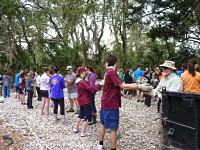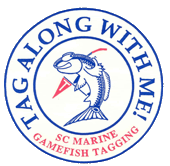Citizen Science Opportunities - Marine Species
Are you looking for an opportunity to volunteer your time helping wildlife? Are you willing to help collect data on species and their habitats? Maybe you want to teach others about fishing or hunting. Chapter 5 of the 2015 State Wildlife Action Plan lists education and outreach efforts as one of the fundamental strategies needing implementation in South Carolina to benefit priority wildlife species and their habitats. In particular, SCDNR and its partners should "promote volunteer participation, both in education and outreach programs as well as in data collection. [High priority]."
There are many opportunities for the public to help gather information that biologists and researchers can use in assessing species and their habitats. Sometimes our biologists need seasonal help with specific projects. That's when our volunteers become vitally important. Listed below are some citizen science weblinks. Some are for SCDNR programs while others take you to our conservation partners' websites.
Marine reptiles (sea turtles) and mammals (dolphins and manatees) can be found in their respective taxa listings in the left side bar.
- Volunteer in Charleston through the SCDNR Marine Resources Division.
- Volunteer at the SC Aquarium to be an aquarist, diver, or exhibit guide.
 Eastern oyster – Reef building through the use of recycled oyster shells improves habitat for oysters as
well as the myriad of other species that depend on the reef system for some phase of their life cycle. Volunteers
are needed to bag shells and help place them in tidal creeks. SCDNR's SCORE
program has several opportunities to volunteer in the oyster recycling process.
Eastern oyster – Reef building through the use of recycled oyster shells improves habitat for oysters as
well as the myriad of other species that depend on the reef system for some phase of their life cycle. Volunteers
are needed to bag shells and help place them in tidal creeks. SCDNR's SCORE
program has several opportunities to volunteer in the oyster recycling process.- Horseshoe crab – Report tagged horseshoe crabs to the U.S. Fish and Wildlife Service or by calling 1-888-Limulus (546-8587)
Marine Fish
- SCDNR Marine Stocking Research Group has a fin clip collection program that encourages fishermen to help them collect genetic samples of the fish they catch.
 Participate in our Marine Game Fish Tagging Program which trains
anglers to actually apply tags to fish and release them so they can be tracked.
Participate in our Marine Game Fish Tagging Program which trains
anglers to actually apply tags to fish and release them so they can be tracked.
- Anglers should report any type of tag recapture
- Fisheries Management Council gives ideas how you can get involved with management issues.
- Atlantic States Marine Fisheries Commission has workshops, meetings, and public review of documents.
- Information on the Bottlenose Dolphin and the West Indian Manatee can be found in the mammals section.
